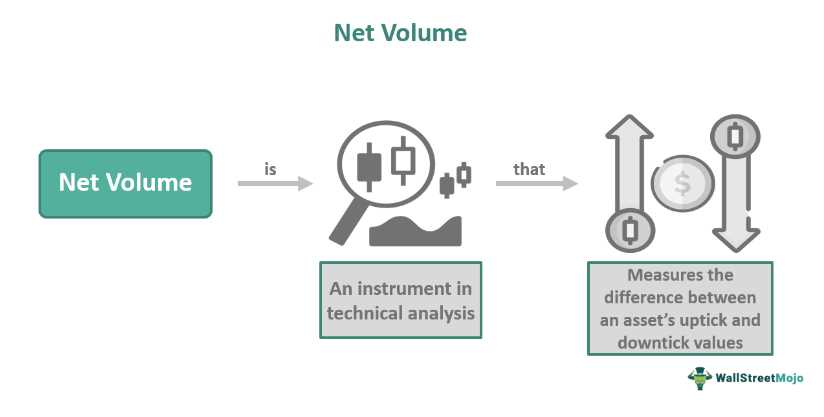What is Net Volume?
Net Volume refers to the amount of space or capacity that remains after deducting the space occupied by certain components or factors. In business, it is a crucial metric used to measure the actual usable volume or capacity of a product, service, or space.
Net Volume takes into account the deductions or exclusions that are necessary to determine the true available volume. These deductions can include packaging materials, empty space, unusable portions, or any other factors that reduce the overall volume.
For example, in the context of a product, the Net Volume would be the actual amount of product that a consumer can use or consume, excluding the space occupied by the packaging or any other non-usable components.
Net Volume is an important consideration in various industries and sectors. It helps businesses accurately determine the available capacity, plan production or service delivery, manage inventory, and calculate costs or pricing.
In summary, Net Volume is the usable or available volume after deducting any non-usable components or factors. It plays a crucial role in business planning, inventory management, and cost calculations.
Importance of Net Volume in Business
Accurate Measurement of Sales
Net volume allows businesses to accurately measure their sales by considering factors such as returns, discounts, and allowances. By subtracting these deductions from the gross volume, businesses can determine the actual revenue generated from their products or services. This information is vital for evaluating the effectiveness of sales strategies, identifying potential areas of improvement, and making informed decisions to drive growth.
Profitability Analysis
| 1. Accurate measurement of sales |
| 2. Profitability analysis |
| 3. Identifying areas for improvement |
| 4. Making informed decisions |
| 5. Optimizing operations |
Net volume calculation is an essential aspect of business operations as it helps determine the true value of goods or services. It involves subtracting any deductions or allowances from the gross volume to arrive at the net volume.
To understand net volume calculation, it is important to first define the terms “gross volume” and “deductions.” Gross volume refers to the total quantity or value of goods or services before any deductions or allowances are made. Deductions, on the other hand, are reductions in quantity or value due to factors such as discounts, returns, or damaged goods.
The net volume calculation is typically done using a formula or equation. This formula takes into account the gross volume and deducts any applicable deductions to arrive at the net volume. The specific formula may vary depending on the industry or business context.
For example, in the retail industry, the net volume calculation may involve subtracting returns or damaged goods from the total sales volume. In the manufacturing industry, it may involve deducting any defective or rejected products from the total production volume.
A net volume calculation is crucial for businesses as it provides a more accurate representation of the actual value of goods or services. It helps businesses make informed decisions regarding pricing, inventory management, and overall profitability.
Furthermore, net volume calculation can also be used to assess the efficiency of business operations. By comparing the net volume over time, businesses can identify trends, patterns, or areas for improvement.
| Gross Volume | Deductions | Net Volume |
|---|---|---|
| 100 | 10 | 90 |
| 200 | 20 | 180 |
| 150 | 15 | 135 |
In the table above, the gross volume represents the total quantity or value of goods or services. The deductions column shows the reductions made, and the net volume is calculated by subtracting the deductions from the gross volume.
Definition of Net Volume Calculation
Net volume calculation refers to the process of determining the total volume of a product or item after deducting any void spaces or non-usable areas. It is an essential calculation in business, particularly in industries where accurate measurements of product volume are crucial.
Net volume calculation takes into account factors such as packaging materials, air space, and any other components that do not contribute to the actual usable volume of the product. By subtracting these non-usable areas, businesses can accurately determine the amount of product that is available for use or sale.
Furthermore, net volume calculation is also important for compliance with industry regulations and standards. Certain industries, such as food and beverage or pharmaceuticals, have strict guidelines regarding accurate volume measurements for product labeling and packaging.
Factors Affecting Net Volume Calculation
Calculating net volume is an essential aspect of any business, as it provides valuable insights into the overall performance and profitability of a company. However, there are several factors that can affect the accuracy of net volume calculations. It is crucial to consider these factors to ensure reliable and meaningful results.
1. Sales and Returns
One of the primary factors that influence net volume calculation is the number of sales and returns. When calculating net volume, it is essential to deduct the returns from the total sales to obtain an accurate representation of the actual volume of goods sold. This helps businesses understand their true revenue and identify any potential issues with product quality or customer satisfaction.
2. Discounts and Promotions
Discounts and promotions can also impact net volume calculations. When offering discounts or running promotional campaigns, businesses need to consider the reduced price and adjust the net volume accordingly. This ensures that the calculations reflect the actual revenue generated after accounting for any discounts or promotional activities.
3. Shipping and Handling Costs

Shipping and handling costs can have a significant impact on net volume calculations, especially for businesses that sell physical products. These costs should be deducted from the total sales to obtain an accurate representation of the net volume. By considering shipping and handling costs, businesses can better understand their profitability and make informed decisions about pricing and logistics.
4. Taxes and Duties

Taxes and duties can also affect net volume calculations, particularly for businesses operating in multiple jurisdictions. It is crucial to account for any applicable taxes and duties when calculating net volume to ensure compliance with legal requirements and obtain an accurate representation of the revenue generated.
Net Volume vs Gross Volume
Definition of Net Volume

Net volume refers to the amount of a product or service that is available for use or consumption after deducting any allowances, discounts, or returns. It represents the actual quantity that customers receive or consume.
Definition of Gross Volume
Gross volume, on the other hand, refers to the total volume of a product or service without any deductions. It includes all units produced or sold, regardless of whether they are actually used or consumed.
So, what’s the difference between net volume and gross volume?
The main difference lies in the deductions. Net volume takes into account any allowances, discounts, or returns, while gross volume does not. Net volume provides a more accurate representation of the actual quantity available for use or consumption.
Why is net volume important in business?
Net volume is crucial for businesses as it helps them understand the actual quantity of products or services that are being used or consumed by customers. This information is valuable for inventory management, pricing strategies, and forecasting demand.
Factors affecting net volume calculation
Several factors can affect the calculation of net volume, including returns, allowances, discounts, and any other deductions that may apply. It is essential for businesses to accurately track these factors to determine the net volume of their products or services.
Difference Between Net Volume and Gross Volume
Net volume and gross volume are two terms commonly used in business to describe the quantity of goods or services being measured. While they may sound similar, there are key differences between the two that are important to understand.
Definition of Net Volume
Net volume refers to the quantity of goods or services after deducting any deductions or reductions. It represents the actual amount that is available for use or consumption.
Definition of Gross Volume
Gross volume, on the other hand, refers to the total quantity of goods or services without any deductions or reductions. It represents the total amount before any adjustments are made.
Key Differences:
- Calculation: Net volume is calculated by subtracting any deductions or reductions from the total quantity, while gross volume is calculated without any deductions or reductions.
- Accuracy: Net volume provides a more accurate representation of the actual quantity available for use or consumption, as it takes into account any deductions or reductions. Gross volume, on the other hand, may overstate the actual quantity.
- Use: Net volume is often used for financial calculations, inventory management, and determining the actual value of goods or services. Gross volume is commonly used for sales reporting, market analysis, and forecasting.

Emily Bibb simplifies finance through bestselling books and articles, bridging complex concepts for everyday understanding. Engaging audiences via social media, she shares insights for financial success. Active in seminars and philanthropy, Bibb aims to create a more financially informed society, driven by her passion for empowering others.
